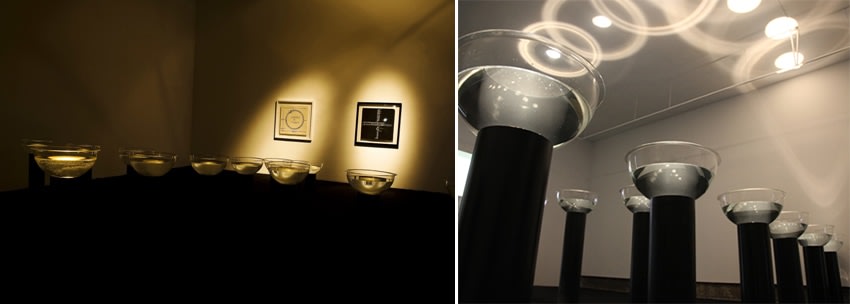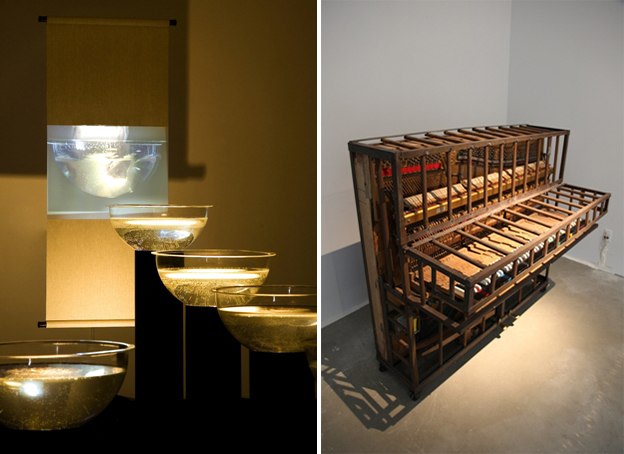Chambers Fine Art is pleased to announce the opening on October 24, 2009 of Tan Dun’s Organic Music, an exhibition devoted to a site-specific exploration of the composer’s deep attachment to the sounds and materials of the natural world. This exhibition originated at Chambers Fine Art Beijing where it was conceived in conjunction with the first performance of Tan Dun’s Organic Music Tears of Nature at The National Centre for the Performing Arts, Beijing in 2008.
Although there has always been a pronounced visual aspect to the performance of Tan Dun’s music, it was only in 2004-5 that he began to conceive of exhibiting installations derived from his performance works in a gallery space. The exhibition Visual Music, one of eighteen one-person exhibitions in the Bunker Museum of Contemporary Art, Kinmen, Taiwan organized by Cai Guo-Qiang in 2004-5 was the first of these. Now, western audiences will have the chance to experience the visual interplay inherent in Tan Dun’s organic music as realized in the installations at Chambers Fine Art and the performance of his music during Carnegie Hall’s Ancient Paths Modern Voices A Festival Celebrating Chinese Culture opening on October 21, 2009.
With this new development in his multi-faceted career, Tan Dun joins the small but distinguished lineage of twentieth century composers who have gravitated towards visual expression at a significant stage in their careers. Arnold Schoenberg painted his haunting series of Expressionist portraits and self-portraits early in his career. John Cage who studied with Schoenberg in the 1930s produced hundreds of prints, drawings and watercolors towards the end of his life. Strongly influenced by John Cage when he arrived in New York in 1985, Tan Dun continues this tradition, not only with the visual beauty and precision of his musical scores but increasingly with installations and their by-products.
The current exhibition comprises two installations. In the larger of the two galleries Water Passion after Saint Matthew is based on the work that was commissioned by the Internationale Bachakademie Stuttgart to commemorate the 250th anniversary of the death of J.S.Bach in 2000. Seventeen transparent water bowls in the form of a cross lit from below lead to a video of the composer that emphasizes the ritualistic aspect of the performance of water music in its focus on the gestures that produce the sounds.
In the smaller gallery to the left of the entrance dismantled and reconstructed pianos enact a drama of deconstruction, reconstruction and resurrection. The discovery of large numbers of abandoned pianos in the music school of Shanghai awakened in Tan Dun a strong feeling that these “survivors” should not be overlooked. As a violent prelude, a video documents the destruction of some that were beyond repair. On the wall a section of a piano keyboard is a mute reminder of past glory. This contrasts with a piano that has survived the loss of its protective shell without losing the ability to produce sounds through computer engineering. Through the iron bars fragmentary melodies emerge.
With this new development in his career, Tan Dun allows a pronounced visual emphasis to enrich his all encompassing sonic world.
前波画廊荣幸地宣布谭盾的个展《谭盾·有机音乐》将于2009年10月24日开幕。《谭盾·有机音乐》是一个专门为前波画廊的新空间而设计的展览,将表现世界著名作曲家谭盾对自然界里声音与物质的深厚兴趣及积极探索。此展览最初来源于谭盾于2008年3月31日在中国国家大剧院的《有机音乐大自然的眼泪》首演,并于同年4月在北京前波画廊展出。
尽管长久以来谭盾的音乐表演里总有着鲜明的视觉化的一面,但直到2004、2005年起,他方才着手在画廊空间里展示源于演出的装置作品。展览《视觉音乐》 是蔡国强在台湾金门碉堡艺术博物馆策划的18位艺术家个展之一(2004-2005年),也是谭盾艺术展览的开始。这次,西方观众将有幸在卡耐基音乐大厅举办的“古今回响”中国音乐节里观看谭盾演出的同时,也将能在前波画廊的新空间体验到谭盾有机音乐的可视性。
随着其跨领域艺术生涯新的发展,谭盾也加入了一小拨20世纪杰出的作曲家行列——他们的创作倾向于视觉表达,且硕果颇丰。阿诺德·勋伯格早年绘制了一系列萦绕脑际的表现主义艺术家肖像和自画像。30年代时师从勋伯格的约翰·凯奇在晚年创作了数百张版画、手绘和水彩作品。谭盾1985年初至纽约时,深受凯奇影 响,并延续了凯奇的传统。他的乐谱充满了美感和精准性,并且将音乐创作揉入到装置作品及其他创作中。 本次展览将包括谭盾以钢琴这一乐器为基础的装置作品。其他作品还包括对纸、水等声响的运用。《纸乐四重奏》基于谭盾2003年创作的音乐《纸乐》,而《复活之旅》的来源则是谭盾受国际巴赫学术院委托,为巴赫逝世250周年而创作的同名音乐作品。。录像装置《水摇滚》以传统的中国画挂轴为载体,但对水的展现却惊心动魄,与传统画中的静谧风景却大相径庭。 前波画廊为此展览出版了同名图录《有机音乐》


